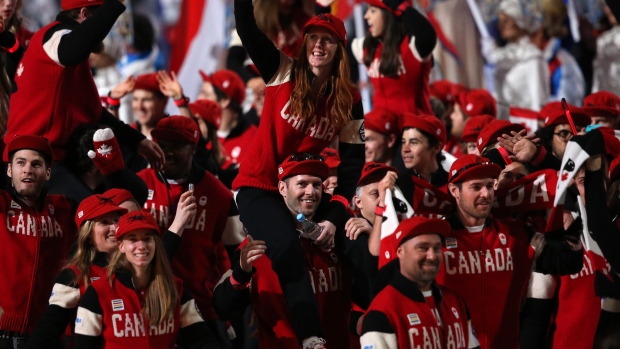May 5, 2015
Judge asked to force COC to disclose sensitive records
A legal battle royal is unfolding that threatens to make public the Canadian Olympic Committee's sensitive financial records, including compensation paid to senior executives and more. As TSN senior correspondent Rick Westhead writes, a B.C. judge has been asked by lawyers representing The North Face apparel company to force the COC to disclose reams of financial information.

A legal battle royal is unfolding that threatens to make public the Canadian Olympic Committee's sensitive financial records, including compensation paid to senior executives and the terms of individual COC corporate sponsorship agreements.
TSN has learned that a B.C. judge has been asked by lawyers representing The North Face apparel company to force the COC to disclose reams of financial information.
The request was filed in connection with a lawsuit filed by the COC against The North Face.
The Olympic committee alleges the company infringed on Olympic trademarks during the Sochi Games in Russia last February when it sold its so-called Villagewear Collection of apparel. "Villagewear" was see as alluding to the Olympic Village where athletes are housed, the COC said in court documents.
The North Face fired back, accusing the COC of trying to restrict Canadians' abilities to express their national pride.
The lawsuit highlights the ongoing battle by Olympics officials to stamp out the practice of ambush marketing, a term coined during the 1980s by the International Olympic Committee to describe companies trying to profit from a perceived tie to the Games without actually paying to be an official sponsor.
Neither The North Face nor its parent company VF Corp. is an Olympic sponsor.
The North Face marketed and released its line of Villagewear clothing in the weeks leading up to the Sochi games. After the COC complained, the company renamed its line the International Collection. It includes ski and snowboard jackets, winter hats and duffel bags in the colours and flags of various countries. The Canadian-themed items are red and white and feature a prominent maple leaf.
Several items have a crest that reads "RU/14." The COC says that's a clear attempt to tie the product line to the Sochi Games.
The Olympic committee's lawsuit, first filed in February 2014, says items were marketed with names like "Men's Sochi Full Zip Hoodie." The product line "captures the international spirit of the Olympic Games," a company catalogue reads.
The COC's allegations have not been proven.
In its statement of defence, The North Face challenges whether the COC even has the right to trademark the Olympic marks.
The COC "has itself failed to adopt or use the alleged Olympic trademarks, and has never been the owner of the said marks, in that the marks have always been beneficially owned by the International Olympic Committee, not the COC," The North Face wrote in pleadings.
The North Face first asked for financial materials last year and says that the COC delivered on Oct. 10, 2014, a list of documents it would provide.
But over subsequent months, it has refused to offer a number of financial documents demanded by The North Face, including:
* Documents regarding COC's private sources of funding from 2010-2014.
* Documents regarding funds raised by the COC from licensing sponsors, supporters, other persons to use the Olympic marks since 2010.
* Documents regarding arrangements, contracts, licenses, and agreements from 2010-2014 between the COC and its official sponsors, official suppliers and official licensees.
* Documents regarding the financial royalties and income received from the merchandise manufacturers since 2010.
* Documents regarding the COC's corporate structure, including governing bylaws in force from 2010-2014.
* Documents regarding the COC board of directors, including agendas and minutes of board meetings, appointment of board members, reports on the operations to the board or management, and composition of the board from 2010-2014.
* Documents regarding officers of COC from 2010-2014 including profiles and employment contracts.
The COC is considered a public authority by government regulators in Canada. That means that it gets special treatment for its application of official marks over those typically given to ordinary trademarks, said Julie MacDonell, a trademark lawyer In Toronto.
MacDonell said a public authority is defined as an agency that's subject to government control within Canada whose activities benefit the public.
The North Face alleges that since the COC's own publicized figures say it receives 95 per cent of revenue from private sources that there's no way the COC should be considered a public authority.
"Without (the requested) documents, there is no context with which to assess the relative significance, portion or proportion of any government funding received by the (COC) in contrast to private monies," The North Face's lawyer wrote. "In effect, only one side of the story is being presented."
The COC countered, saying that The North Face's pleading, challenging the COC's status as a public authority, does not trigger the production of such "a vast universe of documents."
